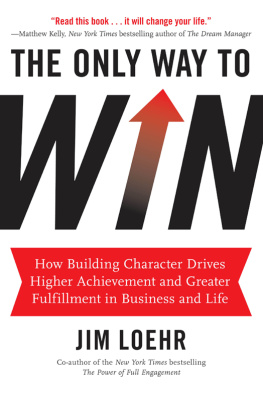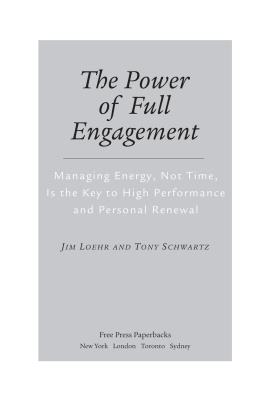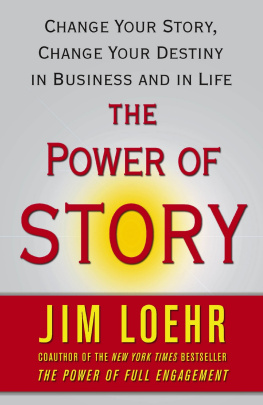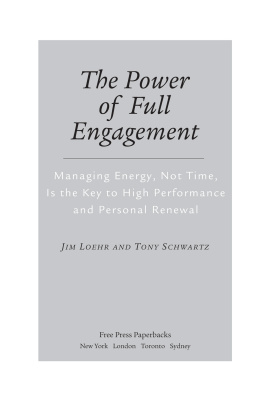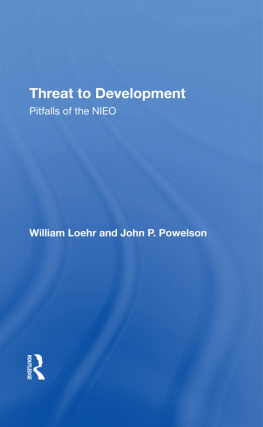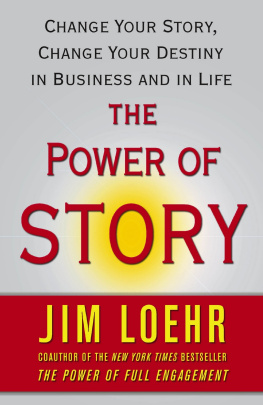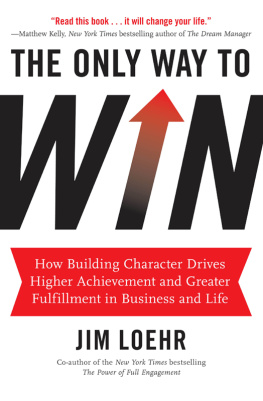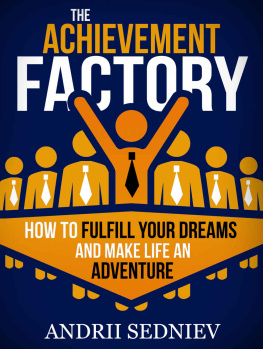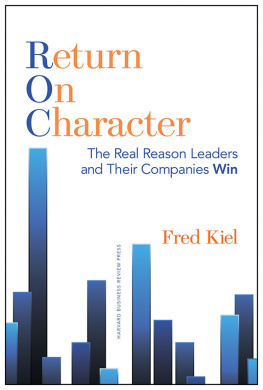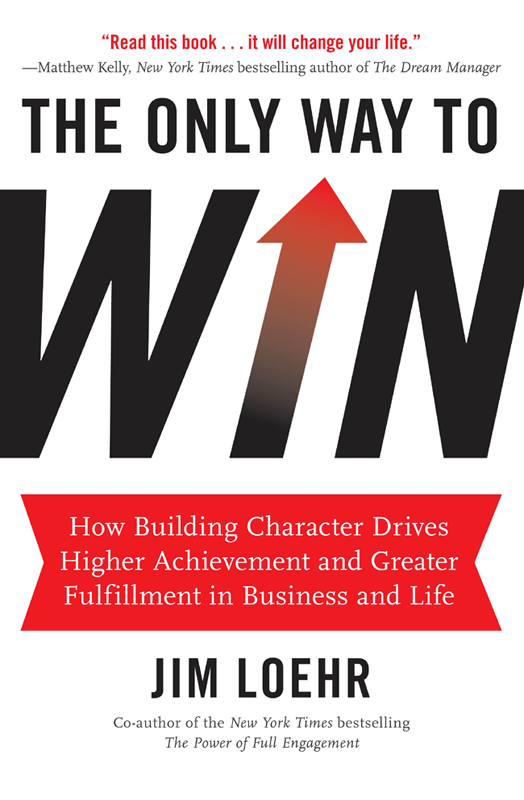
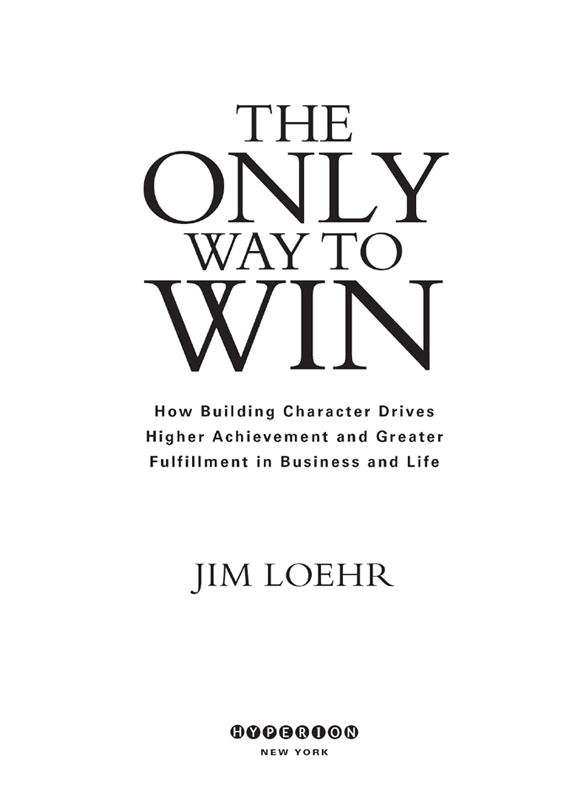
Because the pagination of this electronic edition does not match the print edition from which it was created, any references to specific page numbers should be ignored. Instead, to locate a specific passage within the text, please use the search feature of your e-book reader.
For my Father (Con) and Mother (Mary) and for my three sons (Mike, Pat, and Jeff), for being my greatest character teachers.
When Socrates was unjustly imprisoned and facing imminent death, his jailers asked why he was not preparing for death. His response was simply Ive been preparing for death all my life by the life Ive led.
C oach John Wooden
in How to Be Like Coach Wooden by Pat Williams
The names and identifying details concerning some individuals, as well as some elements of these individuals stories, have been changed to protect their privacy.
Contents
Scott sits four feet across from me, a look of pained recognition in his eyes, and he appears nauseated. His annual salary is somewhere north of a million dollars (not including bonus). He owns three homes, never flies commercial, and commands the faithful service, perhaps even respect, of twenty-four hundred employees. At this very minute, though, this CEO looks as if he is quite literally about to throw up. I wish I could tell you its the first time Ive witnessed such a moment.
Ive been blinded by my ambition, he says in a voice that is both biting and resigned. Last night, when you had me examine my deepest values and examine how Ive lived my life, it hit me like a freight train. I now realize that Ive been hiding from the truth all along. Ive been so eager to get to the top that I neglected the people and compromised the causes that meant the most to me. In a sense, I sold my soul. According to what I thought I wanted, I achieved it all. Im pretty much on top of the world. But according to what I really feel matters to memy family, my health, my relationshipsIve failed. To be honest, Ive known for a long time that at some level, what I was chasing was futile.
Then this man, this winner at all things, abruptly goes quietmystified, stunned, disillusioned.
Scotts profound realization occurred on Day 2 of a two-and-a-half-day workshop, one weve been conducting for fifteen years at the Human Performance Institute (HPI), a company I cofounded in 1992 with famed biomechanics researcher Jack Groppel. At HPI, we specialize in helping individuals and teams perform at the highest possible levels in high-stress environments. Ive had many of these encounters with high achievers before, in both the world of sport, where I had the privilege of working with sixteen world number ones, and the world of business, where I counseled countless executives. All felt an irresistible need to confess that for years they had been chasing things that lack value. Seduced by a false promise of happiness, they devoted most of their energy to things that werent very fulfilling. As a result, while they had successfully achieved most, if not all, of the key indices of success in our societypower, status, beauty, fame, money, and other material wealthsomehow, feelings of dissatisfaction and disillusionment persisted.
This book is not going to be a book about the evils of money, status, and other superficial markers of achievement. I will not suggest that you reject material things, creature comforts, luxury, a nice home, beautiful cars, or titles of prominence (whether that title be CEO or Wimbledon champion). Anyone familiar with my work over the yearsvirtually an entire career devoted to trying to help people accomplish great thingswould find it quite incongruous for me to write a book explicitly assaulting the value of personal achievement.
The problem, as Ive come to see it with ever-increasing clarity, is how the blind pursuit of external achievement can, even when successful, result in profound emptiness for all of us. Years of work with superstars, high achievers, and otherwise rich and famous clients have profoundly affected my understanding of achievement motivation and goal setting. Ive witnessed that it is not just Scott the CEO millionaire who feels as Ive described him feeling, not just the Olympic gold medalist who wonders Is that all there is? Nor is it only the C-suite executive, the partner at a big law firm, or the Ivy League graduate who feels dissatisfied despite the outward success. Its also the salesperson, the middle manager, the nurse, or the stay-at-home mom or dad who often suffers a similar plight. Why is that? Because the system that stirs these feelings is one that we all helped to createleaders, managers, coworkers, coaches, teachers, and parents. Its especially troubling that the roots of this system run so deep and wide that our children cant help but drink from the same well: They are being nurtured in such a way that many of them will suffer much the same lack of fulfillment that so many of their parents do.
In our work with thousands of clients, my colleagues and I have noted that it seems almost not to make a difference how much the individual earns or how apparently nice his or her home is. Does it really matter that Julie earns ten times what Earl earns, if the emptiness experienced by each is the same? What matters is the goals one has pursuedboth the sacrifices one has made to achieve them and the obsessiveness (even addictiveness) with which one has pursued themand the intrinsic satisfaction one has received from the pursuit. And we have found that in most cases our clients are operating under assumptions about the personal return on their achievements that have not only failed to work but, astonishingly, have never even been properly vetted.
Ponder these if-then statements for their inherent promise:
If I summit Mount Everest, then Ill feel like Im someone special.
If I win an Olympic medal, then Ill finally be happy with myself.
If I graduate from an Ivy League school, then it will give me the self-confidence I need to be successful in life.
If I finally get my medical degree, then it will all have been worth it.
If I get that next promotion, Ill finally feel like a success as a leader.
If I buy a home in my dream neighborhood, then Ill be someone .
If I finally get out from under all this financial pressure, then my happiness will improve significantly.
If I write a best-selling book, then Ill be a success.
Ill be someone. Ill feel good about myself. Ill have value. Ill be a success.
We believe such positive feelings are achievable through external achievements like these because various promises have been made to us, relentlessly, from earliest memory. Achievement is viewed as the foundation for a successful life, for stable self-esteem, for fulfillment, and for living a life of significance and meaning.
All of that would be wonderful except for one thing.
These promises are all false.
Most of us have been adhering to measures of achievement that, when we really stop to think about them, dont matter to us. Or they matter to us disproportionately. A simple analysis would reveal that the benefit we get from the achievement by itself may not nearly be worth the energy and time we investor, as well-being experts Ed Diener and Robert Biswas-Diener memorably said about money, Income appears to buy happiness, but the exchange rate isnt great.
If what matters most is not the actual winning or achievement in and of itself, then what does truly matter? It has something to do with the goals you choose, of course, because each goal has consequences. But to my mind, what truly matters mostand these are the questions Ive obsessed over, studied, explored, and tried to articulate for the past three decades of my career and lifeis this: Who do you become as a result of the pursuit of your goals? Who have you become as a consequence of the chase?
Next page
